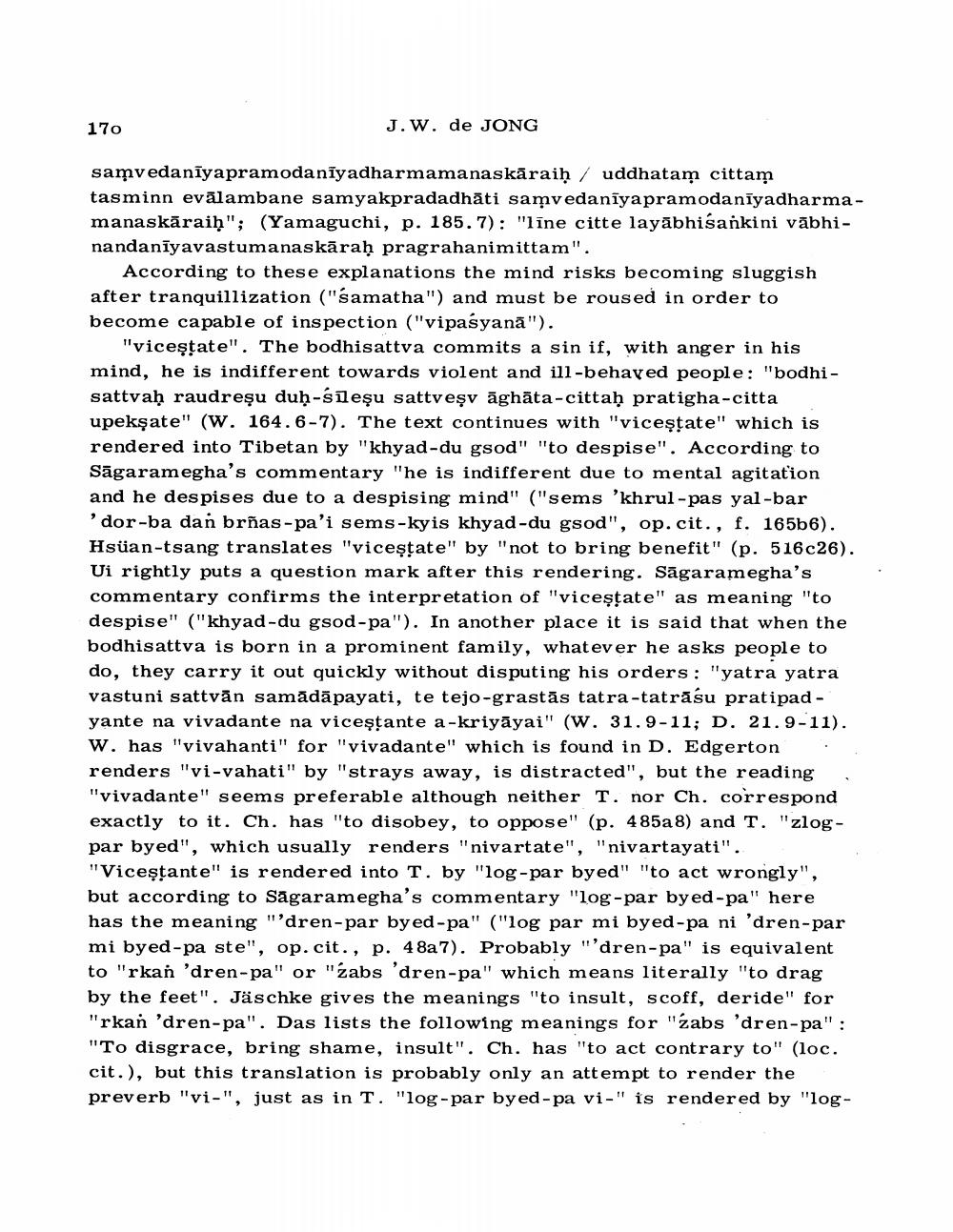Book Title: Notes On Bodhisattvabhumi Author(s): J W De Jong Publisher: J W De Jong View full book textPage 8
________________ 170 J.W. de JONG samvedanīyapramodanīyadharmamanaskāraiḥ / uddhatam cittam tasminn evālambane samyakpradadhāti samvedanīyapramodanīyadharmamanaskāraih"; (Yamaguchi, p. 185.7): "līne citte layābhisankini vābhinandanīyavastumanaskāraḥ pragrahanimittam". According to these explanations the mind risks becoming sluggish after tranquillization ("samatha") and must be roused in order to become capable of inspection ("vipaśyanā"). "viceştate". The bodhisattva commits a sin if, with anger in his mind, he is indifferent towards violent and ill-behaved people: "bodhi - sattvaḥ raudreşu duḥ-sileşu sattveşv āghāta-cittaḥ pratigha-citta upekşate" (w. 164.6-7). The text continues with "viceştate" which is rendered into Tibetan by "khyad-du gsod" "to despise". According to Sāgaramegha's commentary "he is indifferent due to mental agitation and he despises due to a despising mind" ("sems 'khrul - pas yal-bar 'dor-ba dan brñas-pa'i sems-kyis khyad-du gsod", op. cit., f. 165b6). Hsüan-tsang translates "viceştate" by "not to bring benefit" (p. 516c26). Ui rightly puts a question mark after this rendering. Sāgaramegha's commentary confirms the interpretation of "viceştate" as meaning "to despise" ("khyad - du gsod-pa"). In another place it is said that when the bodhisattva is born in a prominent family, whatever he asks people to do, they carry it out quickly without disputing his orders: "yatra yatra vastuni sattvān samādāpayati, te tejo-grastās tatra-tatrāsu pratipadyante na vivadante na viceştante a-kriyāyai" (w. 31.9-11; D. 21.9-11). W. has "vivahanti" for "vivadante" which is found in D. Edgerton . renders "vi-vahati" by "strays away, is distracted", but the reading . "vivadante" seems preferable although neither T. nor Ch. correspond exactly to it. Ch. has "to disobey, to oppose" (p. 485a8) and T. "zlog - par by ed", which usually renders "nivartate", "nivartayati". "Viceştante" is rendered into T. by "log -par byed" "to act wrongly", but according to Sāgaramegha's commentary "log-par by ed-pa" here has the meaning "'dren-par by ed-pa" ("log par mi byed-pa ni 'dren-par mi byed-pa ste", op. cit., p. 48a7). Probably "'dren-pa" is equivalent to "rkan 'dren-pa" or "zabs 'dren-pa" which means literally "to drag by the feet". Jäschke gives the meanings "to insult, scoff, deride" for "rkan 'dren-pa". Das lists the following meanings for "zabs 'dren-pa" : "To disgrace, bring shame, insult". Ch. has "to act contrary to" (loc. cit.), but this translation is probably only an attempt to render the preverb "vi-", just as in T. "log-par by ed-pa vi-" is rendered by "logPage Navigation
1 ... 6 7 8 9 10
